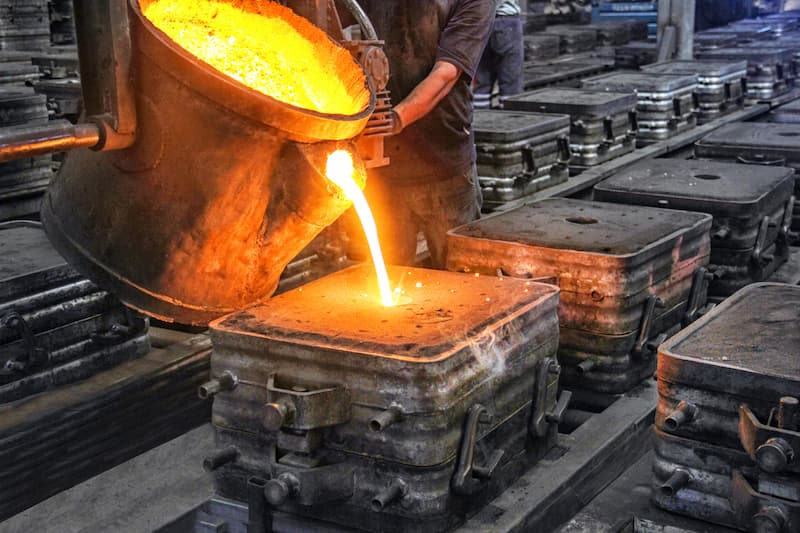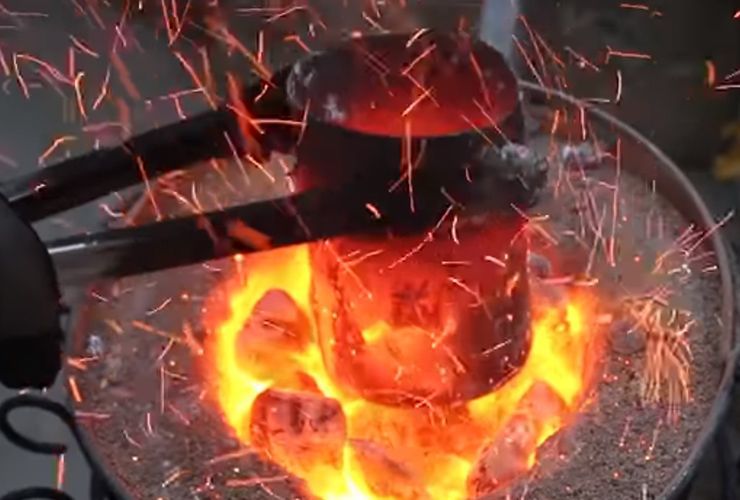Professional Roles in the Metal Casting Industry and How to Get Started
Wiki Article
A Comprehensive Guide to Metal Casting: Advantages and Services Supplied by Foundries
Metal casting is an essential process in numerous markets, providing numerous advantages through the solutions of shops. These facilities change molten metal into accurate and sturdy components, satisfying specific client demands. By employing advanced innovations, shops ensure top quality and efficiency in production. Nonetheless, the intricacies of metal casting and the diverse strategies included elevate essential concerns concerning its role in modern production. What innovations lie ahead in this essential area?Understanding the Metal Casting Process
The metal casting procedure is a basic strategy made use of in making to develop intricate shapes and components. This method entails putting liquified metal right into a mold developed to form the desired item. The procedure begins with pattern development, which acts as a theme for the mold and mildew. Aluminum Casting. Numerous products, such as sand, metal, or ceramic, are used for mold-making, depending on the certain requirements of the casting
Once the mold is ready, liquified metal is poured right into it and enabled to solidify and cool. After solidification, the mold and mildew is eliminated, exposing the cast component. Different techniques, consisting of sand casting, financial investment casting, and die casting, are employed, each matched to different applications and materials. Quality assurance steps, such as examinations and screening, are important to ensure the end product meets requirements. Generally, the metal casting process plays a vital function in producing components for markets varying from vehicle to aerospace.
Key Perks of Metal Casting
Metal casting provides substantial advantages that make it a recommended manufacturing method in numerous markets. Its layout versatility and accuracy enable for detailed shapes, while cost-efficient mass manufacturing enhances effectiveness. Furthermore, the convenience and stamina of products used in casting add to the sturdiness of the end products.Style Adaptability and Precision
Releasing impressive design versatility and accuracy, metal casting permits designers and designers to develop elaborate forms and attributes that would be difficult or tough to accomplish with various other manufacturing techniques. This capacity makes it possible for the production of complex geometries, interior frameworks, and great information that improve item capability and aesthetic appeals. In addition, numerous casting techniques, such as sand casting, investment casting, and die casting, offer additional alternatives for personalization, suiting varied product homes and job needs. The flexibility of mold and mildews allows alterations throughout the design phase, enhancing the change from idea to last item. Eventually, metal casting sticks out for its capability to provide high-precision elements, making it a vital procedure in sectors varying from vehicle to aerospace and beyond.Affordable Automation
Affordable automation stands as one of the primary benefits of metal casting, enabling manufacturers to generate large quantities of elements at a reduced price each. This effectiveness arises from the ability to develop detailed mold and mildews that can be reused multiple times, substantially minimizing configuration and operational prices. In addition, metal casting processes, such as sand casting and die casting, enable high throughput, making it practical to meet the needs of massive production runs. The lowered material waste and energy intake additionally enhance price savings, making metal casting an attractive alternative for markets needing mass components. Overall, the affordable nature of metal casting placements it as a favored method for suppliers aiming for financial effectiveness in their manufacturing processes.Product Adaptability and Strength
Among the standout characteristics of metal casting is its impressive material convenience, which allows for the usage of a wide variety of alloys and steels. This versatility makes it possible for producers to pick materials that finest match their particular applications, from light weight aluminum and bronze to iron and steel. Each metal offers one-of-a-kind properties, consisting of differing levels of stamina, deterioration resistance, and thermal conductivity. Metal casting can produce elements that fulfill stringent performance demands throughout varied industries, such as automobile, aerospace, and building. In addition, the toughness of actors metals can be enhanced with different therapy processes, making sure durability and longevity. Metal Casting. Generally, the mix of product versatility and fundamental stamina makes metal casting a recommended selection for producing top quality componentsTypes of Metal Casting Methods
Metal casting includes a range of methods that satisfy different manufacturing demands and product properties. Common methods consist of sand casting, which makes use of a sand mold and mildew for complicated shapes, and investment casting, known for its precision and surface coating. Pass away casting is an additional strategy that utilizes high-pressure injection of molten metal right into mold and mildews, suitable for mass production of little parts.Covering molding uses a quicker alternate, utilizing a resin-coated sand to create thin-walled mold and mildews, while shed foam casting enables intricate layouts without the requirement for a core.
Additionally, continuous casting is made use of for creating long areas of metal, such as bars or sheets, by solidifying liquified metal in a continual process. Each technique presents one-of-a-kind benefits and is selected based upon factors like the called for information, manufacturing quantity, and material kind, guaranteeing remarkable results in metal manufacture across numerous sectors.
The Role of Foundries in Metal Casting
Shops play a critical duty in the metal casting procedure, serving as the facilities where molten metal is changed right into completed items. These specialized facilities are furnished with the needed devices and modern technologies to manage various steels, ensuring high-quality results. Shops are accountable for a number of essential functions, consisting of thawing the metal, pouring it right into mold and mildews, and allowing it to solidify.In addition, they preserve strict security and ecological standards to safeguard employees and decrease ecological effect. Skilled service technicians and designers work together to optimize casting processes, improving effectiveness and lowering waste. Foundries likewise take part in quality assurance actions, ensuring that the final items meet particular tolerances and specs. This top quality guarantee is important for markets that count on precise components, such as automobile and aerospace. Therefore, factories add substantially to the total production landscape, making it possible for innovation and growth throughout numerous fields.
Customized Metal Casting Solutions
Personalized metal casting solutions provide tailored style services that satisfy details client needs. These services also offer material option expertise, ensuring the best metal is picked for the wanted application. Such versatility and understanding enhance the overall top quality and efficiency of the final product.
Customized Design Solutions
Tailored layout remedies in metal casting offer producers with the adaptability to create parts that meet certain performance and visual requirements. Factories supply personalized services that allow clients to define dimensions, shapes, and surface area coatings to achieve preferred end results. This customization process usually includes partnership between developers and Full Report engineers, guaranteeing that the final items straighten with functional needs and industry requirements. Advanced modern technologies, such as computer-aided design (CAD) and simulation software, allow exact modeling and screening of parts before production, enhancing and reducing errors effectiveness. By leveraging customized style options, organizations can optimize functionality while reducing waste and costs, ultimately resulting in a more one-upmanship in the market. This adaptability is vital for markets needing special applications and specs.Material Selection Proficiency
When choosing materials for metal casting, knowledge plays an important function in guaranteeing that the best choice aligns with both efficiency demands and cost-effectiveness. Shops use competent experts who understand the homes of various steels and alloys, permitting them to suggest optimal materials for specific applications. Variables such as stamina, rust resistance, and thermal conductivity are carefully taken into consideration to satisfy the client's demands. Furthermore, industry trends and advancements in product science educate these decisions, enabling shops to stay affordable. By leveraging their know-how, foundries can aid clients in guiding via complicated product choices, inevitably causing improved item quality and minimized production expenses. This specialized understanding is essential for accomplishing effective end results in custom-made metal casting services.High Quality Control in Metal Casting
Quality assurance in metal casting is vital to guarantee that the end products meet the called for specs and efficiency standards. Factories use a range of methods and strategies to assure the best quality of actors components. This process starts with rigorous material assessments, validating that basic materials adhere to market criteria. Throughout the casting procedure, real-time monitoring and testing are performed to assess parameters such as temperature, mold stability, and dimensional precision.
Applications of Metal Castings Throughout Industries
Metal castings play an essential duty in different industries, working as the backbone for numerous applications. In the automobile sector, cast elements such as engine blocks and transmission real estates are required for automobile performance and reliability. The aerospace sector depends on accuracy spreadings for essential elements that guarantee safety and efficiency in trip. Furthermore, the building and construction industry utilizes metal castings for fixtures, fittings, and architectural aspects, improving the toughness of structures and framework.Furthermore, the energy field gain from spreadings used in generator blades and various other equipment crucial for power generation - Metal Foundry. The medical field additionally uses metal spreadings in gadgets and instruments, demonstrating the adaptability of this production procedure. Generally, metal castings are essential to the performance and innovation of varied fields, showcasing their value in modern-day technology and framework advancement
Frequently Asked Inquiries
What Materials Are Typically Utilized in Metal Casting?
Common materials used in metal casting include light weight aluminum, iron, bronze, brass, and steel. Each material uses unique properties ideal for various applications, enabling manufacturers to select the most effective alternative based on strength, weight, and deterioration resistance.For how long Does the Metal Casting Refine Generally Take?
The metal casting procedure generally takes several hours to a few days, depending upon elements such as the intricacy of the design, sort of metal used, and the particular casting technique utilized by the shop.
What Is the Environmental Effect of Metal Casting?
The ecological effect of metal casting includes energy usage, discharges, and waste generation. Foundries typically execute steps to minimize these effects, such as recycling products and utilizing cleaner modern technologies to lower their eco-friendly impact.Can Metal Casting Be Done for Small-Scale Projects?
Metal casting can certainly be carried out for small-scale projects. Different foundries deal with such demands, providing customized remedies that suit restricted production runs while maintaining quality and accuracy in the final products.What Are the Safety Measures in Metal Casting Foundries?
In metal casting factories, precaution consist of personal protective equipment, appropriate ventilation, training on devices use, emergency procedures, routine upkeep checks, and adherence to industry security standards to decrease risks related to molten metal and dangerous products.Furthermore, metal casting procedures, such as sand casting and pass away casting, permit for high throughput, making it feasible to satisfy the needs of large look here production runs. One of the standout characteristics of metal casting is its impressive product adaptability, which allows for the use of a large variety of steels and alloys. In addition, continual casting is used for generating long areas of metal, such as bars or sheets, by solidifying molten metal in a continuous procedure. Shops play a pivotal duty in the metal casting process, serving as the centers where liquified metal is transformed right into completed items. Common materials utilized in metal casting consist of light weight aluminum, iron, brass, bronze, and steel.
Report this wiki page